
Guests
- Sonny SinghSikh American musician and activist.
The Brooklyn-based Sikh American musician Sonny Singh joins us in our Democracy Now! studio to perform and talk about his remarkable music. Singh gained fame as a member of Red Baraat and now records as solo artist. He recently released a new album titled Sage Warrior and is playing at Joe’s Pub in New York on July 2.
Transcript
AMY GOODMAN: Sonny, welcome to Democracy Now!’s studios.
SONNY SINGH: Thank you. It’s such an honor to be here.
AMY GOODMAN: How did you become a musician?
SONNY SINGH: You know, I became a musician as a child playing Sikh devotional music, going to Sikh camps, learning this instrument, the harmonium, a little bit of this instrument, the tabla. And then I started playing trumpet in school band at the age of 9.
AMY GOODMAN: Growing up in Charlotte, North Carolina, wasn’t so easy for you. Talk about your family.
SONNY SINGH: Yeah, my parents are immigrants from India and —
AMY GOODMAN: Punjab?
SONNY SINGH: Yeah, well, my grandparents are from Punjab. Both sides of my family are from West Punjab, so were refugees after partition in 1947. And my dad came here in 1969 to pursue his master’s in engineering. And I was born in Charlotte. And yeah, you know, growing up in Charlotte in the 1980s with a turban — I didn’t have a beard just yet when I was that young, but even pre-9/11 met a lot of racist harassment. So, music eventually became one of my balms. You know, it became one of the ways that I could channel my anger and pain into something more productive.
AMY GOODMAN: What happened after 9/11?
SONNY SINGH: After 9/11, the racist harassment just spiked in very serious ways. You know, it shaped my childhood before then, but after 9/11, it felt like our community was just under siege completely. And I would say the form of the racism became much more about being called a terrorist or being called Osama bin Laden. It was hard to walk down the street in my twenties in New York without being called Osama or al-Qaeda or “go back to your country” or something along those lines.
AMY GOODMAN: So, talk about what music meant for you.
SONNY SINGH: Yeah, so, music both has been a sort of, like, way to channel my grief and channel my pain and channel my anger, and it’s also been a way that I’ve been able to kind of keep myself in the Sikh spirit of Chardi Kala, which is this idea of radical optimism, ever-rising spirits no matter what. And music is the way that I’ve been able to do that. And what I hope to do through my music is emanate that out — right? — and fill others’ hearts with hope in these pretty dark times.
AMY GOODMAN: Chardi Kala is the name of your first album and the song that you’re playing.
SONNY SINGH: Yes. Yes, it is.
AMY GOODMAN: Tell us more about it.
SONNY SINGH: Yeah, so, you know, my ancestors from the Sikh community — S-I-K-H — have been through a lot, have been through genocidal times, have been through apocalyptic times, because they were revolutionaries — and in theory, we still are — are revolutionaries who see the spiritual and the political as linked. Right? We see fighting for justice and liberation as a form of worship. And as a result, our communities come under attack by those in power quite a bit. And through it all, there’s been this idea that it is a responsibility to remain in Chardi Kala, to remain steadfast. I think it’s quite similar to how Palestinians use the term “steadfast,” right? It’s not just about being happy all the time. That’s delusional. But it’s about having a purpose to wake up every morning, to continue. And I know, Amy, you embody Chardi Kala, because I watch you every morning, and you’re here, right? You know — you know what your mission is. And that’s what I see it’s all about, right? It’s the determination to hold our heads up high and keep fighting for justice. And so, I learned that from my ancestors, and that’s a message that I want to share with the world.
SONNY SINGH: [performing “Chardi Kala”] Chardi kala vich rehende
Chardi kala vich rehende
Bolay so nihaal sat sri akaal
Bolay so nihaal sat sri akaal
O Nanak naam chardi kala
Tere bhane sarbat da bhala
Chardi kala vich rehende
Chardi kala vich rehende
Bolay so nihaal sat sri akaal
Bolay so nihaal sat sri akaal
O Nanak naam chardi kala
Tere bhane sarbat da bhala
O Nanak naam chardi kala
Tere bhane sarbat da bhala
Chardi kala vich rehende
Chardi kala vich rehende
Chardi kala vich rehende
Bolay so nihaal sat sri akaal
Bolay so nihaal sat sri akaal
O Nanak naam chardi kala
Tere bhane sarbat da bhala
AMY GOODMAN: Can you tell us who Guru Nanak is?
SONNY SINGH: Yes. Guru Nanak was the founder of the Sikh movement or the Sikh revolution. I avoid calling it “Sikhism,” because that sort of conforms to these, I think, overly simplistic ideas of religion. But Guru Nanak was born in Punjab in the late 1400s and saw a lot of injustice happening in society, based on caste, based on gender, based on religion. And none of this made sense to him, especially because so much of it was justified through religion, right? The caste system in particular, right? A very ancient form of subjugation and hierarchy, because “God said so,” right? You’re a street sweeper, you’re a toilet cleaner, because of your past lives, right? And for Guru Nanak, this made no sense.
So, we sing a piece of his, “Jaano Jot.” And what that means is, “See the light within all, and do not consider caste or status, for there are no hierarchies in the world beyond.” So, it’s this idea, oneness, that light within all, that’s a core principle of the Sikh faith. But it’s not just a principle for us. It’s a call to action. So, if we really believe that that light is within all, then it’s our responsibility to ensure that my brother Rohin here doesn’t experience exploitation or oppression, that you don’t experience dehumanization — right? — that the people of Gaza don’t experience famine, right? That’s our responsibility to do everything in our power, and that act is a form of prayer. It’s a form of worship.
AMY GOODMAN: Let’s go to “Jaano Jot.”
SONNY SINGH: [performing “Jaano Jot”] Jē dari māṅgatu kūka karē
jē dari māṅgatu kūka karē
jē dari māṅgatu kūka karē
jē dari māṅgatu kūka karē
Mahalī khasamu suṇē
jāṇahu jōti na pūchahu jātī
jāṇahu jōti na pūchahu jātī
āgai jāti na hē
Bhāvai dhīraka bhāvai dhakē
bhāvai dhīraka bhāvai dhakē
bhāvai dhīraka bhāvai dhakē
bhāvai dhīraka bhāvai dhakē
Ēka vaḍā’ī dē’i
jāṇahu jōti na pūchahu jātī
jāṇahu jōti na pūchahu jātī
āgai jāti na hē
Jāṇahu jōti na pūchahu jātī
jāṇahu jōti na pūchahu jātī
Jāṇahu jōti na pūchahu jātī
jāṇahu jōti na pūchahu jātī
See the divine light in all people
See the divine light in all people
āgai jāti na hē
AMY GOODMAN: “Jaano Jot.” That is from your album Sage Warrior and, again, written by Guru Nanak.
SONNY SINGH: Yeah.
AMY GOODMAN: So, let’s go to the other song, “Pavan Guru.” Talk about this song.
SONNY SINGH: So, “Pavan Guru,” these words were also penned by Guru Nanak, the founder of the Sikh revolution. And the words mean “air, the teacher; water, the father; Mother Earth, the great womb. Day and night are both caregiver and midwife. The whole world plays in their embrace.” So, to me — and these are words that I’ve recited my whole life. These words, the Saloks, is used at the end of a lot of prayers that we do, so they’re very iconic in our community, though I don’t think they’ve ever been played quite like this. What we’re doing is actually pretty nontraditional in terms of the genre. But what I see — what I see these words as meaning is we’re finding that wonder, that connection, that oneness in nature and all around us. And again, it’s not just an idea, but it’s a call to action, right? So, it’s a call to action to protect the Earth. It’s a call to action to protect each other and stand up for justice and liberation.
AMY GOODMAN: And tell us about the instrument that you play like an accordion.
SONNY SINGH: Yeah, this is a harmonium. It’s actually a colonial instrument that was introduced in the South Asian subcontinent by Europeans, but we very much made it our own. So, I started playing this instrument when I was a child singing these Sikh devotional songs. And, of course, I also play the trumpet.
SONNY SINGH: [performing “Pavan Guru”] Pawanu guru paani pitaa matra dharati mahatu
Divsu raati dui dai daia khele sagal jagtu
Khele sagal jagtu
Pawanu guru paani pitaa matra dharati mahatu
Divsu raati dui dai daia khele sagal jagtu
Changyia buryia wache dharmu haduri
Karmi apo apni ke nehai ke duuri
Changyia buryia wache dharmu haduri
Karmi apo apni ke nehai ke duuri
Ke nehai ke duuri
Ke nehai ke duuri
Pawanu guru paani pitaa matra dharati mahatu
Divsu raati dui dai daia khele sagal jagtu
Divsu raati dui dai daia khele sagal jagtu
Jini namu dhiaya gaye masakti ghali
Nanak te mukh ujale keti chhuti nali
Jini namu dhiaya gaye masakti ghali
Nanak te mukh ujale keti chhuti nali
Keti chhuti nali
Keti chhuti nali
Pawanu guru paani pitaa matra dharati mahatu
Divsu raati dui dai daia khele sagal jagtu
Pawanu guru paani pitaa matra dharati mahatu
Divsu raati dui dai daia khele sagal jagtu
Pawanu guru paani pitaa
AMY GOODMAN: So, “Jaano Jot” and “Pavan Guru” are on your album Sage Warrior. And if you can talk about the whole concept of this album, which is based on a book?
SONNY SINGH: Yeah, so, the Sage Warrior album, it’s a translation of this concept in Sikhi called Sant Sipahi. And it’s this idea that the spiritual and the political are intimately linked, right? To fight for justice is an act of worship. And the best of revolutionaries, the true revolutionaries, as most — as many, many people have said, including many atheists — right? — is rooted in love, right? It’s rooted in a broader idea. So, that’s what the Sage Warrior album is.
And it came out alongside an incredible book by my friend and sister Valarie Kaur, also called Sage Warrior. So, each chapter in the book corresponds to each track on the album. And so, the idea is it’s an immersive experience. Her book is super beautiful. It’s basically a feminist retelling of Sikh history, telling our history and our struggles through the eyes of Sikh women. And these stories largely have not been told. So, it’s a really, really powerful piece. And as she was drafting the book, she would send me drafts of chapters, and then I would work on the accompanying music to go with that chapter. It was a really fun process.
AMY GOODMAN: And you did a 40-city tour last fall?
SONNY SINGH: Last fall, yeah.
AMY GOODMAN: With her?
SONNY SINGH: Yes, yes. We did a tour in about 40 cities called “The Revolutionary Love Tour,” telling stories from the book, woven in with music from this album.
AMY GOODMAN: And you went to community centers. And talk about the concept of the tour.
SONNY SINGH: Yeah. So, the tour was an unusual music tour. We mostly were not playing music venues. We were playing a lot of community centers. We were playing houses of worship, from gurdwaras to churches.
AMY GOODMAN: And explain what a gurdwara is.
SONNY SINGH: A gurdwara is a Sikh house of worship. So, we did bring — we did bring the show, and we did bring the music into our own community spaces, but also lots of other community spaces. We played in churches. We played in community centers. We played at schools. We played on the Tohono O’odham Reservation in Arizona. We played at camps —
AMY GOODMAN: Along the border.
SONNY SINGH: Yeah, along the border, exactly. We played along the border wall itself. We played at George Floyd Memorial Square in Minneapolis. So, we went to all these different sites around the country, really bringing this message of revolutionary love, in a very fraught election season — and, of course, we’re in a fraught post-election season now, as well — and found that people really need this medicine, right? Our ancestral wisdom can be really important medicine for our time.
AMY GOODMAN: You also always perform with a Palestinian keffiyeh. Can you explain why?
SONNY SINGH: Yeah, for me, it feels like a responsibility when I have a platform, when I have a stage. The Palestinian people have been ignored and forgotten for many a decades, and so it feels like a responsibility for me to stand in solidarity with Palestine, with the people of Gaza, especially now more than ever, when dehumanization has become completely normalized.
AMY GOODMAN: Can you talk about music and resistance, how you put the two together?
SONNY SINGH: Yeah, for me, music and resistance go hand in hand. It’s one and the same. I feel that all music is political, all art is political. And the question is: What are we — what are we doing? What are we saying? Right? To not act in defiance to oppression is to be complicit. So, I feel that every note that I play through my trumpet needs to energize myself and others to fight for justice, to stand up for those in need and center our movements and struggles in love.
AMY GOODMAN: And the two Sonnys also play in Red Baraat? The other Sunny was in Bob Dylan’s [A] Complete Unknown?
SONNY SINGH: Yes, Sunny Jain, yeah, a longtime collaborator and friend. Yeah, we’ve been doing Red Baraat together, along with Rohin in the early days. Jonathan, our guitarist in this band, also plays in Red Baraat.
AMY GOODMAN: And explain what Red Baraat stands for.
SONNY SINGH: Red Baraat is a sort of bhangra brass band that’s been around since 2008, that sort of emanates joy and rebelliousness through our music.
AMY GOODMAN: And, Sonny, you played on Saturday night after the “No Kings” rally at a rally of thousands at Terminal 5 —
SONNY SINGH: Yeah.
AMY GOODMAN: — for Zohran Mamdani?
SONNY SINGH: Yes.
AMY GOODMAN: Why does Zohran Mamdani represent what you espouse and sing about?
SONNY SINGH: Yeah, I mean, Zohran’s campaign and who he is, it’s rare to feel, for me, as someone who’s been involved in movement work for a long time — it’s rare to feel genuinely excited about a mayoral candidate here in New York City. And yeah, Zohran feels like the real deal. He feels really, really grounded in progressive struggles. His values are in the right place. He’s so sharp, so smart. So it’s a no-brainer to support his campaign. It’s been amazing to see the energy behind this campaign, as well. So, I’m excited. Rohin was at that rally playing, as well.
AMY GOODMAN: You know, where we are, Democracy Now! in New York City, right now in Manhattan, we’re right across the street from the Amalgamated Building. You were an organizer, right?
SONNY SINGH: Yeah, I used to come to this neighborhood every day.
AMY GOODMAN: For the union. Explain what you did before you became a full-time musician.
SONNY SINGH: Yeah, I didn’t know you knew that. Yeah, so, my first job —
AMY GOODMAN: I know so much about you, Sonny.
SONNY SINGH: My very first job in New York City in 2003, when I was 23 years old, was working as a organizer and corporate campaigner, so a research — I was called a research analyst, but what I was really doing was digging up dirt on corporations who were basically running anti-union campaigns, and trying to pressure them to do otherwise, in solidarity with the organizing campaigns happening. And the sector that we were working in was mostly industrial laundry factories, so mostly immigrant workers who were doing really dangerous and rough work, washing linens for hospitals and hotels and being treated really, really poorly.
AMY GOODMAN: And as we talk about immigrants being treated poorly, who are doing the most toxic work, you know, whether we’re talking about out in the pesticide-laden fields of California or talking about cleaning up after massive fires, talk about what we’re in this country seeing today and the ICE roundups that are taking place.
SONNY SINGH: Yeah, it’s a really harrowing time. I mean, I think immigrants have long been dehumanized in this country. And I think it’s important for me to acknowledge that I’m the child of immigrants. And in many ways, the way that my community has been positioned through immigration policy is in opposition to others — right? — this sort of myth of the model minority. My family history is exactly that, right? Like, my dad came to pursue a master’s in engineering at a time when it was very easy to do that for someone like him — right? — someone who already had a college degree. And the powers that be very strategically have pitted us against Black folks, have pitted us against other immigrant communities. And what I really think we need to be amplifying in this time more than ever is that we are one, this idea of solidarity. So, any sort of notions of us against them in these times, I think, is really, really dangerous.
And it’s been disturbing to me to see some in my own community, like someone like Harmeet Dhillon, who has a post in the Trump administration — right? — a Sikh woman, child of immigrants, who is using this political moment to basically get ahead. And I feel like it’s a real travesty when we kind of fall into the trap of divide and conquer.
AMY GOODMAN: Introduce the last song to us.
SONNY SINGH: Yeah, so, “Ghadar Machao” is an ode to the Ghadar Party, which was a political organization founded in the early 20th century in Northern California that had the goal of overthrowing the British out of India. And so, they were experiencing all kinds of racism and bigotry, working in the fields, working in the lumber mills. And they still used their free time to organize and send resources back to India to wage revolution against the British. Some of them traveled back to India to do so, as well. And the line that I sing repeatedly in that song, “Baaghi hai naam apna,” this is from a poem by 19-year-old Kartar Singh Sarabha, who was executed by the British at the age of 19 for his political activities. So, it’s a celebration of revolution and rebellion. And there’s also a verse in Spanish, because the Mexican Revolution was unfolding around the same time, and a lot of this first wave of Punjabi immigrants to the United States ended up marrying Mexican women, so sort of a part of American history not talked about or known that often in the spirit of solidarity that we want to embody.
SONNY SINGH: [performing “Ghadar Machao”] Baaghi hai naam apna
I landed here from Punjab
Coolie pukaarda jag saanu
No real home but inquilab
Inquilab, oh inquilab, no real home but inquilab
Ghadar machao baaghi ghadar machao
Ghadar machao baaghi ghadar machao
Ghadar machao baaghi ghadar machao
Ghadar machao baaghi
Baaghi hai naam apna
Sembrando la semilla
El suelo está temblando
La tierra es libertad
Libertad, oh libertad, la tierra es libertdad
Ghadar machao baaghi ghadar machao
Ghadar machao baaghi ghadar machao
Ghadar machao baaghi ghadar machao
Ghadar machao baaghi oh oh
Ghadar machao baaghi ghadar machao
Ghadar machao baaghi ghadar machao
Ghadar machao baaghi ghadar machao
Ghadar machao baaghi oh oh oh
AMY GOODMAN: Sonny Singh, here in our Democracy Now! studios. Check out his latest album, Sage Warrior. I’m Amy Goodman. Thanks so much for joining us.

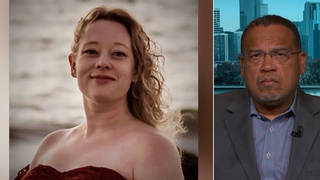
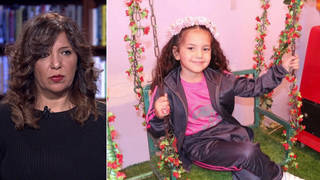
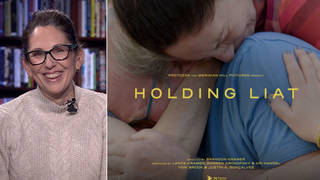
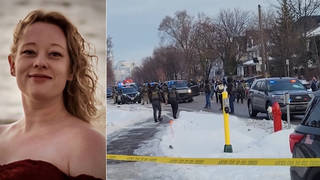
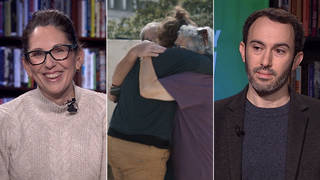

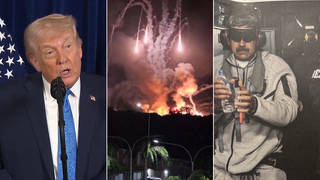
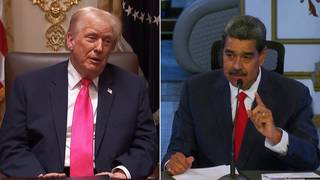



Media Options